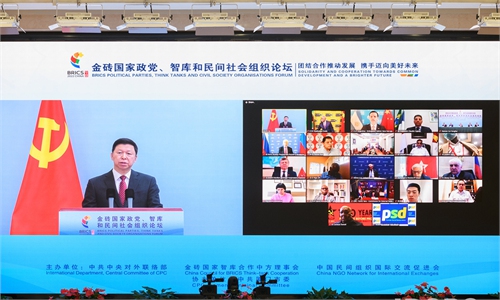
Illustration: Chen Xia/GT
The current international situation is complicated. The COVID-19 pandemic continues to spread, and the crisis in Ukraine looms large. Unilateralism and hegemonism go hand in hand. In the maritime field, traditional and non-traditional security challenges are emerging one after another, and maintaining the global maritime order faces continuous and severe challenges. At this moment, improving global maritime security governance has become increasingly urgent. The implementation of the global security initiative proposed by China in the maritime field should be a preferred path.
Traditional maritime disputes such as territorial sovereignty and maritime demarcation over maritime islands and reefs are still one of the important factors that trigger frictions and conflicts between countries. These sovereignty or demarcation disputes are traditional maritime geopolitical challenges that are difficult to be completely resolved in the short term. In addition, with the deepening of human understanding of the ocean and intensified competition for the utilization of marine resources, transnational maritime criminal activities such as piracy, armed robbery, drug trafficking, and non-traditional maritime security challenges such as rising sea levels, marine pollution and the depletion of fishery resources are also increasing day by day.
In terms of maritime rules and order, the international law of the sea represented by the 1982 United Nations Convention on the Law of the Sea, as a result of political games and compromise of interests between different parties, has inherent deficiencies in the distribution system of maritime rights and cannot fully meet the current global practice of marine security governance. With the resurgence of unilateralism, hegemonism and power politics, the game between traditional maritime powers and emerging maritime countries and developing countries around the construction of global maritime order and rules and over maritime rights and interests will also intensify.
In order to maintain maritime security, relevant countries have carried out a lot of international cooperation in recent years, such as escorting in the Gulf of Aden and the Strait of Malacca. However, due to the lack of mutual trust because of competition around marine resources, some traditional maritime countries adhere to outdated concepts of sea power and exclusive regional security mechanisms, it is difficult to build a new type of maritime governance and cooperation mechanism, and maritime security cooperation often stays on initiatives only.
In the face of these challenges, I believe that exploring the implementation of China's first-ever Global Security Initiative in the maritime domain will have great benefits in helping achieve common maritime security around the world. Therefore, we should first adhere to the general principle of settling maritime disputes and conflicts by peaceful means, including dialogue, consultation, and diplomatic efforts. Historical experience has shown that this is still the most effective way to maintain world peace and stability. This principle should become the bottom line acknowledged by all countries to achieve common maritime security.
Second, we should try to enhance the governance of global maritime security through "bilateral cooperation first, multilateral second." We can start with the relatively easy bilateral cooperation, based on which we need to gradually expand the scale of cooperation and eventually build a multilateral cooperation mechanism that substantially benefits all participants.
In this process, certain countries may attempt to divide the region and exclude the majority of regional countries from the multilateral mechanism based on ideology. We should pay extra attention to such a practice and resolutely oppose the "pseudo-multilateralism" that creates exclusive cliques.
Third, we should adhere to the purposes and principles of the UN Charter to strengthen global maritime security governance in various forms and means. The institutional design of the UN Charter highlights the goals of common security and permanent peace for mankind.
In recent years, China has deeply participated in the negotiations on new rules to maintain the maritime order. This includes agreements on the conservation and sustainable use of marine biodiversity in areas beyond national jurisdiction and regulations on the exploitation of minerals in the international seabed area.
The implementation of the Global Security Initiative in the field of oceans is a matter of peace and prosperity of oceans all over the world. Only by resolving maritime disputes a peacefully, promoting maritime cooperation under the concept of a maritime community with a shared future, as well as proactively strengthening the international order and rules of maritime security governance, can we truly safeguard the common maritime interests of mankind and realize the beautiful vision of lasting peace and universal security.
The author is Director of the Research Center of Oceans Law and Policy in the National Institute for South China Sea Studies. opinion@globaltimes.com.cn

